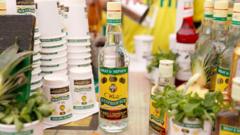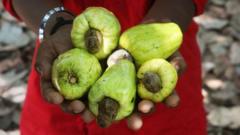In Jamaica, rum is more than just a beverage; it's an integral part of the island’s cultural heritage. However, a recent legal dispute has ignited a debate over what qualifies as "Jamaican rum." At the center of this controversy is the Jamaican Intellectual Property Office's (JIPO) amendments to the geographical indication (GI) regulations governing the liquor. Approved in October, these amendments prohibit the aging of rum outside Jamaica, a move pushed by the local Spirits Pool Association (SPA), which represents six Jamaica-based distilleries, including Appleton and Clarendon.
The SPA argues that the new regulations are essential for gaining recognition and protection in significant markets such as the EU and the US. They contend that a stronger geographical indication would help solidify the premium status of Jamaican rum and shield it from foreign competitors. However, the changes have sparked outrage from National Rums of Jamaica (NRJ), a major industry player that claims they would jeopardize its business. NRJ, which controls Long Pond and a significant portion of Clarendon distillery, relies heavily on exporting rum in bulk and aging it overseas—a practice now banned under the new rules.
In the midst of this heated debate, NRJ is appealing the JIPO's ruling, insisting that rum aged abroad can still be classified as Jamaican. They maintain that the practice of aging rum outside of Jamaica has a long-standing history and should not undermine the island's rum heritage. Christopher Gentles, general manager of the SPA, rebuts this, emphasizing the importance of aging rum within Jamaica's borders for authenticity and uniqueness.
The implications of this conflict extend beyond vocal producers; they touch on the economic benefits tied to local production. Gentles underlines thataging rum overseas causes Jamaica to miss out on additional economic value, such as refining and bottling processes, which could bolster local tourism. The value of geographical indications is further underlined by legal expert Dev Gangjee, who points out that products labeled with GI can command substantially higher prices and help advertise their region of origin.
Interestingly, a similar rum-related dispute is brewing in Barbados, where the nation currently lacks a GI designation. There, too, one distillery, Wird, objects to proposed regulations that favor local aging of rum, echoing the tensions seen in Jamaica.
The SPA hopes to secure EU Protected Geographical Indication classification for Jamaican rum, but such aspirations remain contingent on the outcome of the ongoing dispute with NRJ. Gentles expresses hope for an eventual resolution, perhaps finding common ground to ensure the integrity of Jamaican rum is maintained. In the meantime, media outlets like The Gleaner stress the significance of protecting a brand that symbolically represents Jamaica's spirit and history amid increasing foreign influence in the industry.
The SPA argues that the new regulations are essential for gaining recognition and protection in significant markets such as the EU and the US. They contend that a stronger geographical indication would help solidify the premium status of Jamaican rum and shield it from foreign competitors. However, the changes have sparked outrage from National Rums of Jamaica (NRJ), a major industry player that claims they would jeopardize its business. NRJ, which controls Long Pond and a significant portion of Clarendon distillery, relies heavily on exporting rum in bulk and aging it overseas—a practice now banned under the new rules.
In the midst of this heated debate, NRJ is appealing the JIPO's ruling, insisting that rum aged abroad can still be classified as Jamaican. They maintain that the practice of aging rum outside of Jamaica has a long-standing history and should not undermine the island's rum heritage. Christopher Gentles, general manager of the SPA, rebuts this, emphasizing the importance of aging rum within Jamaica's borders for authenticity and uniqueness.
The implications of this conflict extend beyond vocal producers; they touch on the economic benefits tied to local production. Gentles underlines thataging rum overseas causes Jamaica to miss out on additional economic value, such as refining and bottling processes, which could bolster local tourism. The value of geographical indications is further underlined by legal expert Dev Gangjee, who points out that products labeled with GI can command substantially higher prices and help advertise their region of origin.
Interestingly, a similar rum-related dispute is brewing in Barbados, where the nation currently lacks a GI designation. There, too, one distillery, Wird, objects to proposed regulations that favor local aging of rum, echoing the tensions seen in Jamaica.
The SPA hopes to secure EU Protected Geographical Indication classification for Jamaican rum, but such aspirations remain contingent on the outcome of the ongoing dispute with NRJ. Gentles expresses hope for an eventual resolution, perhaps finding common ground to ensure the integrity of Jamaican rum is maintained. In the meantime, media outlets like The Gleaner stress the significance of protecting a brand that symbolically represents Jamaica's spirit and history amid increasing foreign influence in the industry.




















